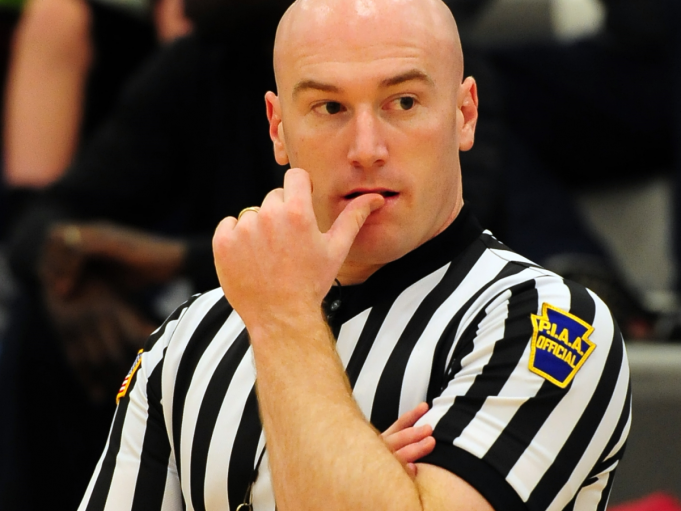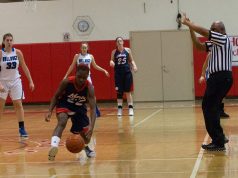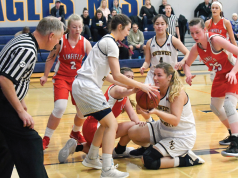Whenever you work a basketball game, it’s always a good practice to be thinking — but not for too long.
Yes, it’s important to keep yourself mentally ahead of the game; to be aware of the situation, alert to the nuances of play and the skill of the players — thinking with them and being prepared. Without this approach you lack presence in the game, stand to make less consistent decisions, and can lose the trust of players and coaches. Problems really start, though, when you go beyond getting into the heads of the contestants and start getting into your own, too.
Because I am particularly boring, I’ll watch bits and pieces of 30-40 Iowa high school games each season on the local cable network. Partly, I want to see who is working games that I’m not, but mostly, I’m a junkie for the science of officiating. I’ll spend a few minutes observing each man or woman working the game, comparing their positioning, mechanics and situation management to that of my own crew. I’m looking for little nuggets of inspiration — something I haven’t thought of before, which sometimes becomes the grist of one of these articles.
In the case at hand, I’ll see a half dozen “blarges” per season, where defender intimately meets dribbler, a cloud of dust rises and then clears for us to see that the covering official has called … nothing. Sometimes, I’ll see a traveling violation that even Stevie Wonder would call passed on by an official. You get the drift. Significantly, these officials certainly aren’t newcomers and often are well-regarded, so their (non)actions bear the question, “What (if anything) were they thinking on that one?”
I know that because that’s what the commentator inevitably blurts out. Then, his equally astute color person quotes something from rule 11 in a rulebook that has only 10 rules to explain the call and I change the channel to The Big Bang Theory.
But what were they thinking on the play? OK, many incorrect calls made by officials at even the highest levels result from them being surprised; something so unusual happens on a play that it catches them off-guard and they just boot it; stuff happens. Everybody gets that — even Bill Walton. In other cases, however, I witness what appears to be a form of analysis paralysis. That’s a condition where you have so many things going through your head when a play occurs that you can’t see the forest for the trees. It’s sensory overload that your brain can’t process quickly enough to make a correct call or even a saleable guess. Instead of doing something, worse happens — you do nothing.
At first blush, I would seem to have described two very opposite phenomena that cause the same failure: surprise (lack of information) and freezing (too much information). In actuality, the two arise from much the same source. Let me explain: Have you ever been standing somewhere, holding a piece of paper and had it slip from your hand? The first few times it happened, you might have looked down, seen it fluttering to the floor, lunged for it and perhaps lost a tooth on the edge of a nearby table. After a few such bouts, an interesting thing starts happening: With repetition, when the paper slips away, you reach for the paper and catch it before your brain has a chance to say, “Hey, dummy, you dropped the paper: catch it.” What’s happened is you’ve developed a neural pathway — a programmed response — that actually moves faster than cognition. You recognize a situation and react reflexively to it, before your brain has a chance to analyze the situation and make a decision.
Let’s go back to our official. One of my early mentors told me it would take 100 games before I would really know what kind of official I could be. It would take that long before I’d practiced enough and seen enough that I could do most things on the court without having to measure twice and cut once. Built into that was seeing enough block/charges and episodes of Dance of the Pivot Foot to develop a mental image of what was legal and what wasn’t — that neural pathway that we’re talking about.
Fear not, I’m not going to launch into a prescription of the key things to look for in the seven most common calls in basketball. I will say — since you asked — that I stand far enough away to see the defender get his or her feet down before contact then watch for contact on the torso. If I register that picture, I’ve got a charge; otherwise, I’ve got a block. There … I’ve reduced 5,000 collisions and 4,900 whistles to two feet and two shoulders on one person. I promise you my whistle is blowing and my signal is forming before my brain is asking whether I got it right. Go ahead and quibble about my oversimplification of the rules or how you would do it differently; the fact is good officials have engrained mental images they apply in making the bang-bang calls on fouls and violations that often decide close games.
With this in mind, an official misses a call when surprised because there isn’t a mental image of that particular situation loaded into memory. Hence, said officials must process what they just saw and sometimes get it wrong. You never reach the point where you’ve seen everything; as my mentor promised me, however, you can reach the point of having seen most things enough that you identify plays correctly more than you call fouls.
This should all help to explain where analysis paralysis sets in at the other end of the spectrum. In this state of mind, you aren’t necessarily surprised all the time. Sometimes you’re still learning the job and those pathways haven’t formed completely. Other times, you might be working your way up the ladder, (re)learning rules and adapting to a faster pace. In this situation, you’re still in the process of drafting Mental Image 2.0, recalibrated to the new parameters and complexities of the level you’ve stumbled into. More often than not, I find, you’re a mere mortal who lets some combination of fatigue, self-doubt or even fear wiggle into your head and obscure those responses you’ve practiced producing.
Let’s go back to the piece of paper — only, this time, I’m standing beside you. I tell you that I might slap the paper from your hand in the next 30 seconds and I expect you to do 10 pushups if you don’t catch it. Different scenario, isn’t it? Now, you’re preoccupied with a possible situation, which has the potential for problems for you — or not — if it occurs. Now, you’re thinking less about the conversation we’re trying to have and more about trying to prepare for the how, when and why of what might transpire. The chances are very good you’re in for some exercise because I’ve clogged your neural pathways with litter.
I’ve learned to recognize little cues in my two partners. Make no mistake, they’re two solid individuals, sound basketball officials and I’d be honored to go anywhere with them. Nonetheless, there’s the odd time when I see them starting to think about the surroundings or maybe the previous play instead of the next play. They undoubtedly can say the same thing about me. My point is when that starts happening — when they begin thinking too much — I do what I can to bring their focus back to the matter at hand. “Want the next call” is a favorite of mine. “Don’t give them the satisfaction” has its place, too. A reminder to “referee the defense” seems to resonate with our group, too, when it comes to rebooting Mental Image 2.0.
Whatever it takes, working to have an uncluttered mental outlook is one of the very best tools in becoming an outstanding official. Some people are just so humble, others so dedicated and a few so self-possessed that it never occurs to them to sweat the details like others do. They concentrate on the game itself rather than the consequences thereof and it just … flows.
Think about whether you have the imagery developed we’ve talked about. If something’s missing, studying video, attending camps and reading all the Referee literature can lead the way in things that help accelerate that development. Think about how you execute your mechanics and call plays; envision yourself making the right call. Then, take that preparation out on the floor, and let that “feel” take over.
Plan for success and think — but not too long — about how you’ll achieve it.
What's Your Call? Leave a Comment:
Note: This article is archival in nature. Rules, interpretations, mechanics, philosophies and other information may or may not be correct for the current year.
This article is the copyright of ©Referee Enterprises, Inc., and may not be republished in whole or in part online, in print or in any capacity without expressed written permission from Referee. The article is made available for educational use by individuals.


















